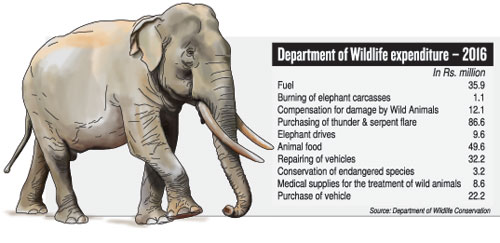News
Armed services, STF in mission to protect elephants
With Sri Lanka’s majestic jungle king, the elephant, being regularly slaughtered and facing extinction, the military may be called in to join in the mission to save them.
The Wildlife Ministry is to submit a cabinet paper to seek military assistance to protect the elephants, an official said.
During the past three weeks, five elephants, including tuskers, were killed and a baby jumbo went missing.
Ministry Secretary Douglas Nanayakkara said the cabinet paper would seek approval for military personnel from the nearest security forces camp to assist wildlife officials in protecting the elephants.
He said the three armed forces and the Police Special Task Force( STF) would be deployed at wildlife sanctuaries where poaching was on the increase.
He said that in the second phase of the operation, a retired STF Senior Superintendent would be appointed to coordinate the operations against poachers.
The Secretary said the Wildlife Department would also be streamlined with salary increases and promotions given to officers who were doing good work. New officers would also be recruited.
“As a long-term solution, the department has decided to amend the Flora and Fauna Ordinance to impose strict penalties such as life imprisonment for those found guilty of killing elephants or other endangered animals,” he said.
As a last resort, the department would also impose restrictions on people entering wildlife parks and reserves.
Mr Nanayakkara said in areas where there were human-elephant conflict, the department hoped to provide good cows to poverty-stricken families so that they would not go clear jungles or invade elephant habitat for cultivation.
Grass had been planted in some areas for these cows to graze.
Environmentalist Shashikalana Ratwatte said that in addition to the human-elephant conflict, there were an increasing number of poachers killing tuskers for ivory.
He said some elephants were shot, other electrocuted and some poisoned.
He said the Wildlife Department needed more staff and recruitment should be made soon. Some wildlife officers did not have vehicles and even those who had often ran short of fuel. These issues need to be resolved first.
Mr. Ratwatte said he was not happy about the plans to provide cows and feared the situation could become worse. He said it was possible that cattle would move into the forest and eat the grass there, forcing elephants to invade villages in search of food.
He said that the department has to focus more on conservation methods.
Mr Ratwatte requested the department to use GPS tracking collars for elephants and special protection teams for elephants so they could identify and profile each elephant at parks in a methodical way.
He said elephant killers and those involved in the ivory mafia should face severe punishment including confiscation of their properties.
| DNA test on Dalapoottuwa’s remains | |
| The Department of Zoological Gardens is carrying out a microscopical analysis of a sample taken from the tusker, Dalapoottuwa, which was killed three weeks ago at the Thabbowa park in Galgamuwa. The Valuation Department has been asked to value the tusks. Zoological Department Director General Dammika Malsinghe said the analysis, including a DNA test, was being carried out on a court order. She said the value of the tusks was needed for prosecution purposes because penalty could be severe if the tusk was more valuable. However, the former Customs Bio Diversity Protection Unit (BPU) Chief Samantha Gunasekara said that according to the Flora and Fauna Ordinance, tough action could be taken against those who commit crimes against wildlife. He expressed concern over publicly revealing the value of tusks because it might encourage poachers to kill more elephants. |

